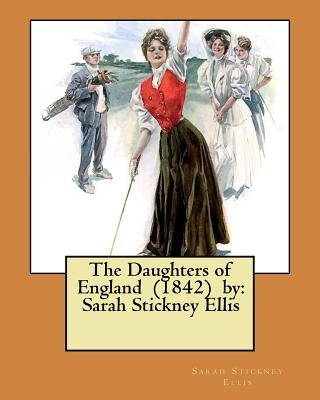
- We will send in 10–14 business days.
- Author: Sarah Stickney Ellis
- Publisher: CreateSpace Independent Publishing Platform
- ISBN-10: 198139320X
- ISBN-13: 9781981393206
- Format: 20.3 x 25.4 x 0.7 cm, softcover
- Language: English
- SAVE -10% with code: EXTRA
Reviews
Description
Sarah Stickney Ellis (1799-16 June 1872) was a Quaker turned Congregationalist who was the author of numerous books, mostly written about women's role(s) in society. She argued that it was the religious duty of women, as daughters, wives, and mothers, to provide the influence for good that would improve society. Particularly well-known are The Wives of England, The Women of England, The Mothers of England, and The Daughters of England, also her more directly educational works such as Rawdon House and Education of the Heart: Women's Best Work. Related to her principal literary theme of moral education for women, she established Rawdon House in Hertfordshire; a school for young ladies intended to apply the principles illustrated in her books to the "moral training, the formation of character, and in some degree the domestic duties of young ladies.", With few exceptions, boys and girls were educated separately in nineteenth century England, and the question of how to educate women was a subject of great debate. It was quite common for women, as well as men, to believe that they should not be educated in the full range of subjects, but should focus on domestic skills. Elizabeth Sandford wrote for women in support of this view, whilst others such as Susanna Corder ran a novel Quaker girls' school at Abney Park instituted by the philanthropist William Allen that dissented from convention by teaching all the latest sciences as early as the 1820s. In Education of the Heart: Women's Best Work (1869) Sarah Ellis accepted the importance of intellectual education for women as well as training in domestic duties, but stressed that because women were the earliest educators of the men who predominantly ran and decided upon education in Victorian society, women primarily needed a system of education that developed sound moral character in their offspring.
- Author: Sarah Stickney Ellis
- Publisher: CreateSpace Independent Publishing Platform
- ISBN-10: 198139320X
- ISBN-13: 9781981393206
- Format: 20.3 x 25.4 x 0.7 cm, softcover
- Language: English English
Sarah Stickney Ellis (1799-16 June 1872) was a Quaker turned Congregationalist who was the author of numerous books, mostly written about women's role(s) in society. She argued that it was the religious duty of women, as daughters, wives, and mothers, to provide the influence for good that would improve society. Particularly well-known are The Wives of England, The Women of England, The Mothers of England, and The Daughters of England, also her more directly educational works such as Rawdon House and Education of the Heart: Women's Best Work. Related to her principal literary theme of moral education for women, she established Rawdon House in Hertfordshire; a school for young ladies intended to apply the principles illustrated in her books to the "moral training, the formation of character, and in some degree the domestic duties of young ladies.", With few exceptions, boys and girls were educated separately in nineteenth century England, and the question of how to educate women was a subject of great debate. It was quite common for women, as well as men, to believe that they should not be educated in the full range of subjects, but should focus on domestic skills. Elizabeth Sandford wrote for women in support of this view, whilst others such as Susanna Corder ran a novel Quaker girls' school at Abney Park instituted by the philanthropist William Allen that dissented from convention by teaching all the latest sciences as early as the 1820s. In Education of the Heart: Women's Best Work (1869) Sarah Ellis accepted the importance of intellectual education for women as well as training in domestic duties, but stressed that because women were the earliest educators of the men who predominantly ran and decided upon education in Victorian society, women primarily needed a system of education that developed sound moral character in their offspring.


Reviews